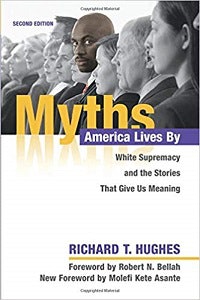In this era of emboldened and undeniably racist discourse, Richard Hughes’s Myths America Lives By is a breath of fresh air. Although the examination of the “mythical history” of America may initially seem familiar to readers, Hughes’s thought-provoking historical analysis reveals the primal myth of White supremacy as one that fuels all other American myths.
By examining the five-fold mythical portraits of America as a chosen, natural, millennial, Christian, and innocent nation, the author argues that Whiteness is at the heart of each mythical notion. Whereas White supremacy is often dismissed as antithetical to American values or condemned to the margins of White nationalist organizations, Hughes contends that White supremacy is deeply embedded in culture and permeates the lives of every individual in the United States. 
By illuminating hidden racist discourses, Hughes invites readers to examine the unacknowledged influence of White supremacy on their own perspectives and motivations. The book also challenges readers to evaluate the extent to which White supremacy defines contemporary racial conflict and national dissonance. Hughes presents a twofold argument in the book: (a) the myth of White supremacy is the central myth that informs the five other myths, and (b) the five other myths serve to preserve and conceal the myth of White supremacy and uphold the myth of innocence that is afforded to some Americans. Although the author criticizes the use of American myths to enact goals of White supremacy, the book concludes with a redemptive assertion that such myths can contribute to forging a new future.
Summary of the Book
Hughes opens the book with a brief summary of the five myths and creatively invites readers to contemplate the related strengths and pitfalls of our national stories. Rather than unequivocally rejecting these myths, Hughes asserts that, when Americans correctly pursue the noblest ideals of such myths, equal opportunity can and should be afforded to all. In actuality, however, American history and present circumstances illustrate the extent to which the vision of equality repeatedly falls short of reality. Through meticulously researched evidence, Hughes centers the divergent experiences of two Americas, one Black and one White, to illustrate how the nation’s myths disadvantage Black communities for the benefit of Whiteness. Inviting readers to question the causes of a bifurcated America, Hughes progresses through the five myths to illustrate White supremacy as the root cause of our divided nation.
Hughes argues that notions of White supremacy are often shrouded by the other five myths and hidden from individuals with privileges afforded to White skin. Such circumstances result in the pervasive nature of White privilege and the ways in which racist ideologies nourished early American life and governance. To grasp the depth of White supremacy, Hughes recounts the racist statements of early and recent national leaders and thinkers, frequently pairing these illustrative quotes with scholarly commentary to highlight the connection between demeaning racial attitudes and government and commercial interests. Guiding the reader through centuries of relevant historical, religious, and cultural sources, Hughes critically illustrates the unrelenting influence of White supremacist beliefs in society.
Challenging readers to choose a future-oriented response, Hughes encourages readers to end the influence of White supremacy in shaping American identity. Such a response requires Americans to carefully discern how personal assumptions are shaped by the nation’s mythical history and fueled by White supremacist convictions. Hughes, however, encourages readers to not fully abandon the five myths. In contrast, the book concludes that, when the five myths are not misused for White supremacy, these myths have the potential to produce an equal and just nation. Through this introspective process, readers are challenged to acknowledge and denounce the myth of White supremacy and construct ways to actualize the potential of the nation.




















